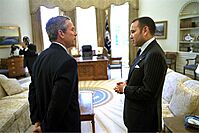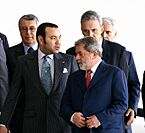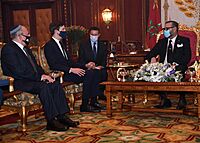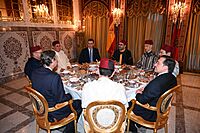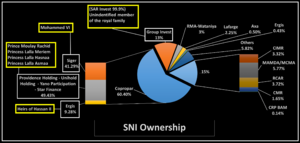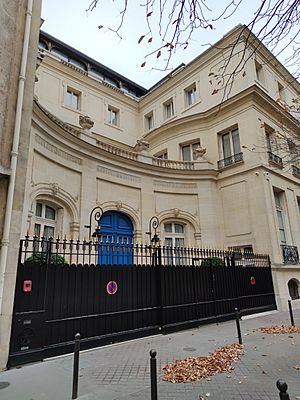Mohammed VI of Morocco facts for kids
Quick facts for kids Mohammed VIمحمد السادس |
|||||
|---|---|---|---|---|---|
| Amir al-Mu'minin | |||||
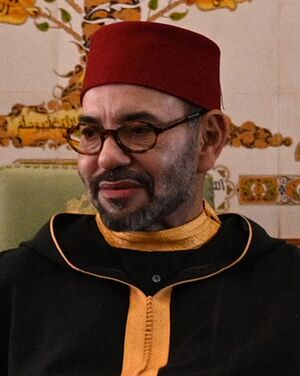
Mohammed VI in 2022
|
|||||
| King of Morocco | |||||
| Reign | 23 July 1999 – present | ||||
| Predecessor | Hassan II | ||||
| Heir apparent | Moulay Hassan | ||||
| Born | 21 August 1963 Rabat, Morocco |
||||
| Spouse | |||||
| Issue Detail |
|||||
|
|||||
| Arabic | محمد السادس | ||||
| Dynasty | Alawi | ||||
| Father | Hassan II | ||||
| Mother | Princess Lalla Latifa | ||||
| Religion | Islam | ||||
Mohammed VI (Arabic: محمد السادس, romanized: Muḥammad as-sādis; born 21 August 1963) is the current King of Morocco. He is part of the Alawi dynasty, a royal family that has ruled Morocco for a long time. He became king on 23 July 1999, after his father, King Hassan II, passed away.
When he became king, Mohammed VI started many important changes. He updated the family laws to give more rights to women in Morocco. In 2011, there were protests in Morocco where people asked for more fairness in the government. In response, King Mohammed VI introduced a new constitution and other reforms. These changes were approved by the public in a vote on 1 July 2011. He also worked to make Morocco's economy and military stronger. He promoted Berber culture, making Standard Moroccan Amazigh an official language alongside Standard Arabic. He also worked to reduce the influence of extreme religious ideas.
In terms of foreign policy, King Mohammed VI continued his father's approach of being a moderate leader. He built stronger relationships with important countries like the United States, the European Union, and China. He also focused on improving ties with African countries and gaining international support for Morocco's claim to Western Sahara. During his rule, Morocco became one of the Arab League countries to establish official relations with Israel through the Abraham Accords.
King Mohammed VI has many business interests in Morocco. He is considered one of the wealthiest kings in Africa. In 2015, Forbes magazine called him the richest king in Africa and the fifth wealthiest monarch in the world.
Contents
Early Life and Education
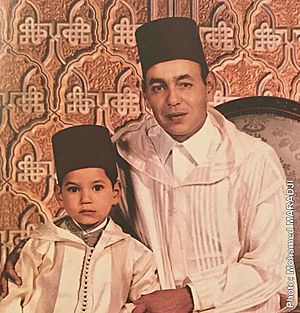
Mohammed was born on 21 August 1963. He was the second child and first son of King Hassan II and his wife, Lalla Latifa. As the oldest son, he was expected to become king from the day he was born.
His father, King Hassan II, wanted Mohammed to have a strong religious and political education from a young age. When he was four, he started attending the Quranic school at the Royal Palace. His school day began early with an hour of recitation from the Quran, followed by regular lessons. He completed his early studies at the Collège Royal, a special school built inside the palace walls. To make sure Mohammed worked hard, his father chose 12 smart classmates to study with him.
When Mohammed was ten, he started representing his father at events in other countries. His first trip was to the funeral of French president Georges Pompidou in 1974. Mohammed was very good at learning languages.
Mohammed finished his high school studies in 1981. He then earned a bachelor's degree in law from the Mohammed V University at Agdal in 1985. His research paper was about "the Arab-African Union and the Strategy of the Kingdom of Morocco in matters of International Relations." He also became the president of the Pan Arab Games and was made a Brigadier General in the Royal Moroccan Army in 1985. He worked as a coordinator for the Royal Armed Forces until 1994.
In 1987, Mohammed earned a higher degree in political sciences. In 1988, he got another advanced degree in public law. He also trained in Brussels with Jacques Delors, who was the President of the European Commission.
Mohammed earned his PhD in law with high honors in 1993 from the French University of Nice Sophia Antipolis. His thesis was about the relationship between the EEC (European Economic Community) and the Maghreb region. In 1994, he was promoted to Major General in the military. That same year, he became president of the High Council of Culture and Commander-in-Chief of the Royal Moroccan Army.
Becoming King and Early Rule
Mohammed became king after his father's death on 23 July 1999. He was officially crowned a week later. In a speech on television, he promised to fight poverty and improve human rights in Morocco. He also promised to create more jobs. Some of his early decisions included removing his father's strict interior minister, Driss Basri. He also appointed some of his former classmates to important government jobs.
King Mohammed VI and his sister, Princess Lalla Meryem, visited the United States in June 2000. They were guests of President Bill Clinton. In 2004, the Bush administration named Morocco a major non-NATO ally. The two countries later signed a free-trade agreement in 2006. This was the only agreement of its kind between the United States and an African country.
In February 2004, King Mohammed VI introduced a new family law (Mudawana). This law gave women more rights and power. In July, he announced that Morocco would remove visa requirements for people from Algeria. The Algerian president, Abdelaziz Bouteflika, did the same for Moroccans in 2005. Mohammed VI also created the Equity and Reconciliation Commission. This group was tasked with looking into human rights violations that happened during his father's rule. Many people saw this as a step towards democracy.
In March 2006, the government created the Royal Advisory Council for Saharan Affairs (CORCAS). This committee supports Morocco's claim to Western Sahara. Its members are chosen by the king. The CORCAS suggested a plan for Western Sahara to govern itself, but still remain part of Morocco. King Mohammed VI visited Western Sahara in 2006 and 2015.
2011 Protests and Constitutional Changes
The 2011 Moroccan protests were led by a group called the 20 February Movement. People were protesting about government fairness and economic difficulties. These protests were influenced by similar events in Tunisia and Egypt. Protesters in Morocco asked for quick political and social changes, including the king giving up some of his powers.
In a speech on 9 March 2011, King Mohammed VI said that the parliament would get "new powers." These powers would help it with its duties of representing the people, making laws, and regulating the country. He also announced that the courts would become more independent from the king. He formed a committee of legal experts to write a new draft constitution by June 2011. On 1 July, voters approved the political changes proposed by the king in a referendum.
The main changes included:
- Standard Moroccan Amazigh became an official national language, along with standard Arabic.
- The prime minister (now called "head of government") leads the Council of Government. This council prepares the country's general policies. Before, the king held this position. The prime minister also gained the power to dissolve the parliament.
- The king must now choose the prime minister from the party that wins the most seats in parliamentary elections. This person can be any member of the winning party, not just the party's leader.
- The king is no longer described as "sacred or holy," but his "integrity" is "inviolable."
- Important government and diplomatic jobs (like ambassadors and leaders of state-owned companies) are now appointed by the prime minister and the ministerial council, which the king leads. Before, the king alone had this power.
- The parliament gained the power to grant amnesty (forgive certain crimes). Before, only the king had this power.
- The king ensures that the court system is independent from the law-making and executive branches of government.
- Women are guaranteed "civic and social" equality with men.
- The king still has full control over the armed forces, the court system, religious matters, and foreign policy. He also keeps the power to appoint and dismiss prime ministers.
- In theory, all citizens have freedom of thought, ideas, artistic expression, and creation.
Recent Developments
Morocco's Internal and Western Sahara Policies
In January 2017, Morocco stopped the making, selling, and marketing of the burqa.
Starting in late 2019, several countries that support Morocco in the Western Sahara conflict opened consulates in the Western Saharan cities of Laayoune and Dakhla. By 2023, there were 28 such consulates. In November 2020, the Western Sahara conflict saw an increase in tensions. This happened when Sahrawi protesters blocked a road connecting Guerguerat to sub-Saharan Africa. Morocco responded by using its military to reopen the road.
On 20 December 2022, King Mohammed VI invited the Moroccan national football team to a special event at the Royal Palace in Rabat. This was to celebrate their achievement of reaching fourth place at the 2022 FIFA World Cup. He honored the team members with the Order of the Throne. In March 2023, he was invited to receive an award from the Confederation of African Football (CAF). During the ceremony, a letter from King Mohammed VI announced that Morocco would join the Portugal–Spain 2030 FIFA World Cup bid to co-host the FIFA World Cup. This bid was approved by FIFA in October.
In May 2023, King Mohammed VI approved making Yennayer (Berber New Year) a national public holiday.
After the September 2023 Al Haouz earthquake, which caused many deaths, King Mohammed VI visited hospitals to support victims. He also donated blood to help those in need. Following his instructions, the royal holding company Al Mada donated a large sum of money to help with relief efforts in the affected areas.
Foreign Policy
In recent years, King Mohammed VI has focused more on Morocco's relationships with African countries. In July 2016, he sent a letter to the African Union (AU) summit, asking for Morocco to rejoin the organization. Morocco had left the AU's previous version in 1984. Morocco was accepted back into the African Union in January 2017.
Under his leadership, Morocco has also built partnerships with the Gulf Cooperation Council and other powerful countries like China and Russia. This helps Morocco have more trade and investments, reducing its reliance on the European Union and other Western countries. Morocco offered to help resolve the Libyan crisis and remained neutral during the Qatar diplomatic crisis.
Morocco and Israel officially restored diplomatic relations on 10 December 2020. This was part of an agreement that also involved the United States. The U.S. recognized Morocco's sovereignty over Western Sahara at the same time. In June 2021, King Mohammed VI congratulated Naftali Bennett on becoming Israel's prime minister. In November 2021, on the International Day of Solidarity with the Palestinian People, the king said that Morocco would continue to push for new peace talks between Israelis and Palestinians.
In August 2022, King Mohammed VI stated that the Western Sahara issue would be a key part of Morocco's foreign policy. He asked other countries to clearly state their positions on the conflict. In 2023, Israel became the second country to recognize Moroccan sovereignty over the territory. Paraguay followed in 2024.
Relations with neighboring Algeria have remained difficult, even though King Mohammed VI has called for reconciliation. Tensions increased in the 2020s, mainly because of the Israel–Morocco agreement and border clashes in Western Sahara. In August 2021, Algeria accused Morocco of supporting a group it blamed for wildfires in northern Algeria. Algeria later ended diplomatic relations with Morocco.
In February 2023, King Mohammed VI and his foreign minister visited Gabon. They met with its president and donated a large amount of fertilizer to the country. On 4 December 2023, King Mohammed VI visited Dubai at the invitation of the UAE President. The two leaders signed an agreement to develop strong relations between their countries.
Business and Wealth
King Mohammed VI is a leading businessman and banker in Morocco. In 2015, Forbes magazine estimated his wealth to be around US$5.7 billion. The Moroccan Royal Family owns most of the shares in a large holding company called Al Mada. This company used to be called the Société Nationale d'Investissement (SNI). Al Mada has many important businesses in Morocco. These businesses operate in different areas like Attijariwafa Bank (banking), Managem (mining), Marjane (hypermarket chain), and Wana-Inwi (telecommunications).
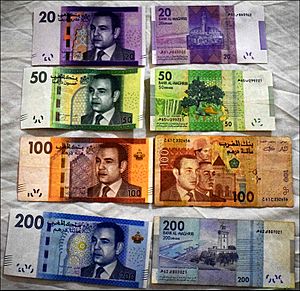
King Mohammed VI is also a major agricultural producer and land owner in Morocco. His personal company, SIGER, owns shares in a large agricultural group called Les domaines agricoles. This group was started by his father, Hassan II. In 2008, it was estimated that Les domaines had a revenue of $157 million. The company officially owns 12,000 hectares of farmland.
The daily operating budget for his palace is reported to be $960,000. This amount is paid by the Moroccan state.
Family and Personal Life

King Mohammed VI has three sisters: Princess Lalla Meryem, Princess Lalla Asma, and Princess Lalla Hasna. He also has one brother, Prince Moulay Rachid.
His engagement to Salma Bennani was announced on 12 October 2001. They married in a private ceremony in Rabat on 21 March 2002. Their wedding celebration took place at the Dar al-Makhzen in Rabat in July 2002. Salma Bennani became princess consort with the title of Her Royal Highness after their marriage. They have two children: Crown Prince Moulay Hassan (born 8 May 2003) and Princess Lalla Khadija (born 28 February 2007). The couple's divorce was announced on 21 March 2018.
King Mohammed VI's birthday on 21 August is a public holiday in Morocco.
In 2020, King Mohammed VI bought a large mansion in Paris.
Health
King Mohammed VI's health has been a topic of discussion.
In 2017, he had a successful eye surgery in Paris. In February 2018, he had a procedure to help with an irregular heart rate. In September 2019, he was advised to rest due to a lung infection. His son, Crown Prince Moulay Hassan, represented him at a funeral during this time. In June 2020, he had another procedure in Rabat for a heart issue.
In June 2022, King Mohammed VI tested positive for COVID-19. His doctor said he had no symptoms and needed a few days of rest. He made his first public appearance after recovering in July 2022. In December 2024, he had surgery after breaking his left shoulder in a fall.
Images for kids
See also
 In Spanish: Mohamed VI de Marruecos para niños
In Spanish: Mohamed VI de Marruecos para niños
 | Roy Wilkins |
 | John Lewis |
 | Linda Carol Brown |



